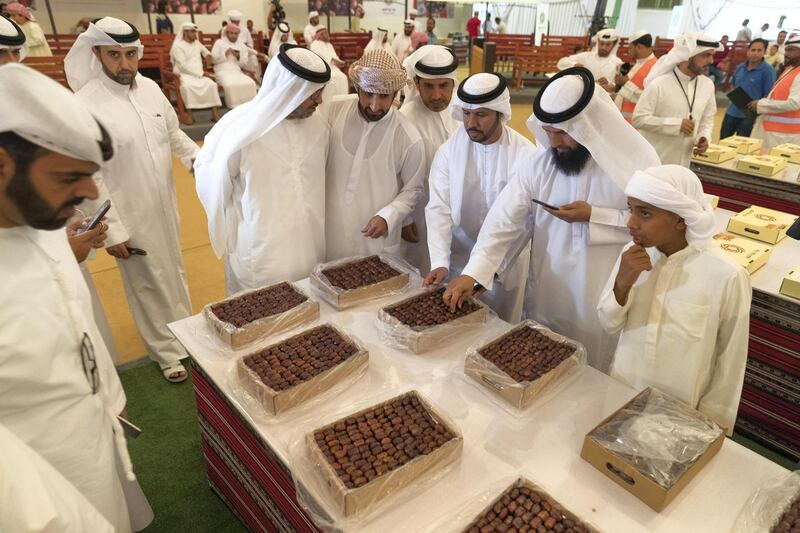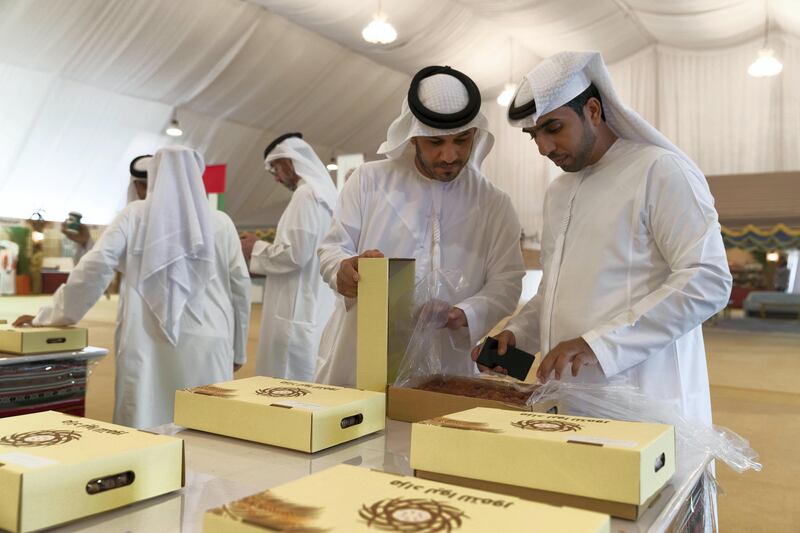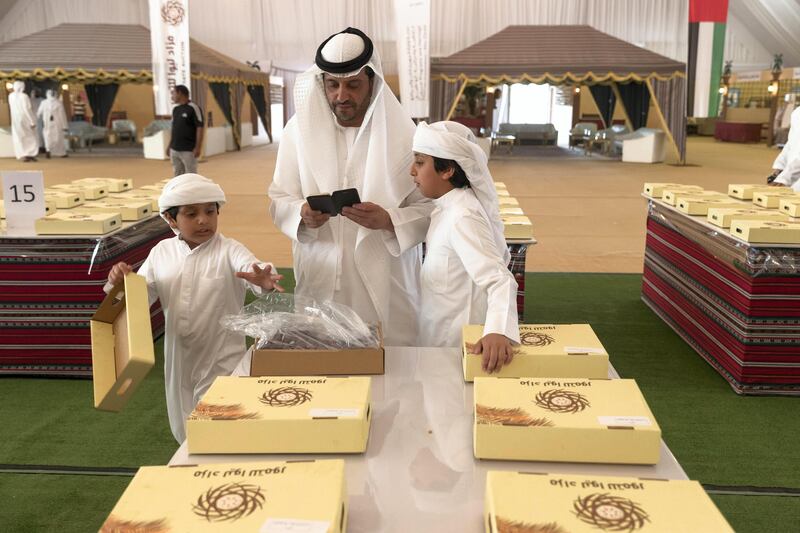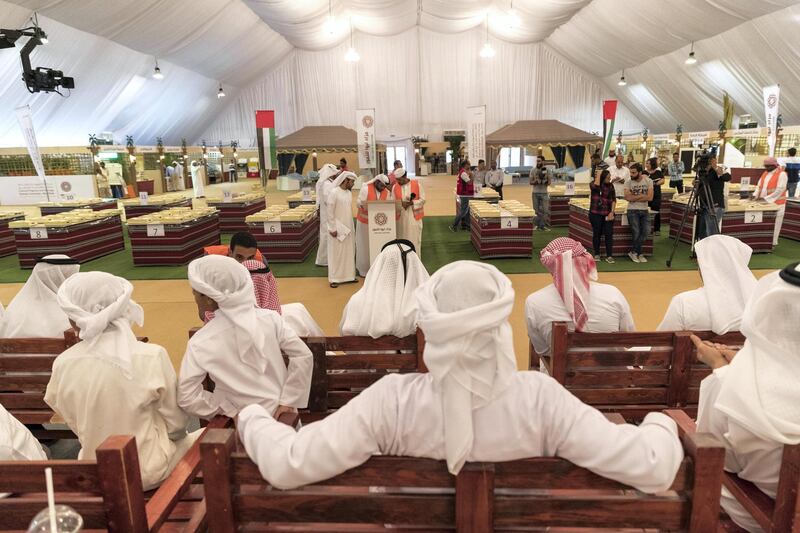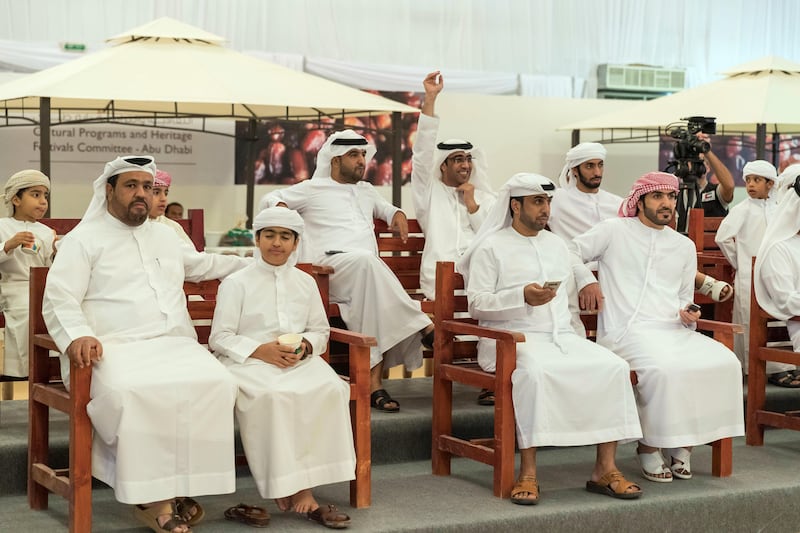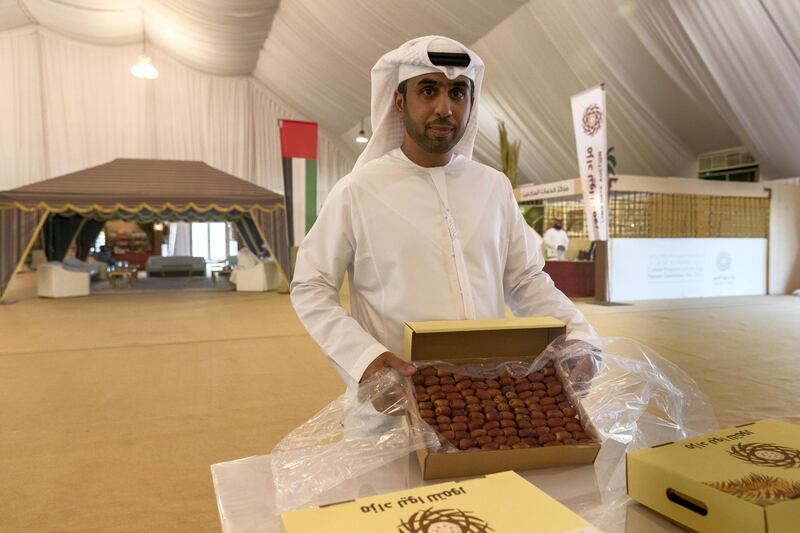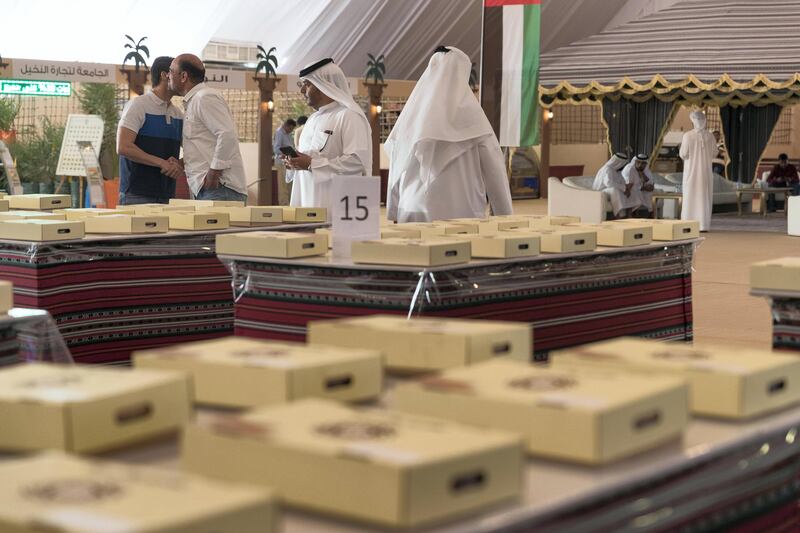The Liwa Date Auction is not for everyone. It is by farmers, for farmers. It is a place of relaxed and well mannered business. It is open to the public but teenagers will not be coming here to Snapchat the merriment.
The first annual Liwa Date Auction kicked off this weekend, with more than 3,000kg of organic dates selling for Dh100,000 in the first two nights.
As farm owners entered the chandeliered tent, they were met by servers offering glasses of zaatar tea and the music of renowned Baniyas singer Eida Al Menhali, his lyrics praising the Liwa oasis as a place of unparalleled relaxation.
Bidding began at six sharp, under the guidance of the Sudanese auctioneer and Liwa resident, Mohammed Ahmed.
This government sponsored auction seeks to encourage entrepreneurship, demonstrating that premium dates command high prices when properly branded. All dates were organic and had been sized, cleaned and packaged in special boxes by sellers.
“It’s first time I’m selling my dates to see the benefit and I’m feeling that there is interest,” said Mohammed Saif, a human resources manager and farm owner auctioning 10 boxes of dabbas dates in lot number 18. “This is my best dabbas.”
Mr Saif has 400 palms. Like many farmers, he grows dates for himself and sells the excess to Al Foah date factory, which gave him Dh6 per kilogram this year. He is considering selling independently and came on the recommendation of a friend who had found success through WhatsApp.
“There is profit in Al Foah but he told me if you sell it yourself you’ll make more money,” said Mr Saif.
_______________
Read More:
[ Family rivalry plays out at Liwa Date Festival ]
[ Date palm cloning ensures traditional UAE industry has a sweet future ]
[ UAE's first annual Liwa Date Auction to kick off on Thursday ]
_______________
For Mr Saif, date farming is as much about heritage as profit. Nearly all the farm owners in attendance had well paid jobs as engineers, high-level government employees and entrepreneurs. For them, one month's salary can easily outstrip a farm’s annual net profit. Instead, they grow for family, friends and charity.
This week’s auction will prove the date’s market potential, said Obaid Khalfan, the projects director of its organising committee. “Farmers are selling to Al Foah but we need to open another line and another market to them. The shelf life for the dates is almost a year. If someone can be creative and is buying dates, it’s a business opportunity for them.”
Dates sold from Dh5 to Dh327 per kilogram.
Who was bidding? Other farmers, particularly those who had already sold their stock to Al Foah and wanted to buy quality, pre-packaged dates.
In future, buyers from outside the community will be attracted through social media, said farmers.
“Now all of the shaibas [older men] have groups on WhatsApp,” said Saleh Al Mazrouei, a high school graduate who will study at Arizona State University this winter.
“Look,” he said, pointing to his father Saeed. “You see? On his iPhone he has open a group chatting about the auction. All of the farmers they have a community and they make groups on WhatsApp.”
His father nodded. “Our friends maybe have around 1,000 followers and when these people see my Snapchat, sure they will come to buy. If you have a lot of followers, they will come.”
On the sidelines, local date factories sold rutab juice made of green dates, date chutneys, date jelly, pickled dates, and the date spread Tamrella, whose labelling bears more than a passing resemblance to its chocolate and hazelnut competitor.
Could auctioned dates end up as chutney served on tables in Bavaria? No chance. These dates are too good for chutney.
But not the very best. Farmers are saving those for date competitions at Al Dhafra in December and Al Wathba in January. Prizes at government sponsored competitions are more lucrative than any sale.
“All people go to Al Dhafra and Al Wathbah,” said Mr Saif. “Last year I placed tenth. That’s still good. I receive Dh5,000.”
Government figures indicate that date production has been constant in recent years, particularly in the Al Dhafra region where 34,586 tonnes were produced in 2016. Anecdotally, farmers believe date cultivation has increased in the last 15 years following subsidies cuts to water-thirsty crops like cucumbers and tomatoes.
“You know, people are reorganizing their minds again,” said Mr Saif.
The only constant, he said, was love for the date. “Before I think of my profit, I think of my own home. I have three refrigerators I make full in my house for my family and my friends. That’s why I keep my farm. So I can eat dates, every day.”
The Liwa Date Auction is hosted by the Cultural Programmes and Heritage Festival Committee and continues from 4pm to 9pm on Thursday, Friday and Saturday. A date and agriculture market will be open every evening until October 14.
